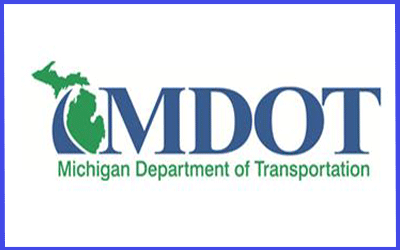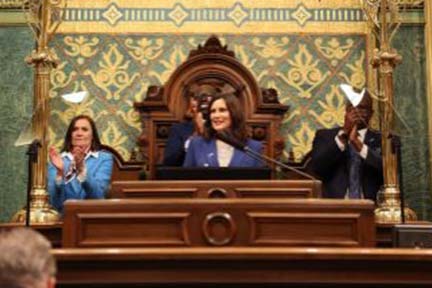
MDOT supports $700 million Rebuilding program

|
| FOR IMMEDIATE RELEASE January 25, 2024
|
MEDIA CONTACT Michael Frezell 517-281-6519 [email protected] |
MDOT supports Gov. Whitmer for authorizing the final
$700 million of the Rebuilding Michigan program
Fast facts:
- Whitmer’s Rebuilding Michigan program continues to rebuild the state highways and bridges (I, M and US routes) that are critical to the state’s economy and carry the most traffic.
- The program will see $700 million more in investments this year to continue work on existing projects.
- A total of $3.5 billion in bonds to finance road construction projects was authorized by the State Transportation Commission between 2020 and 2024.
LANSING, Mich. – Michigan Department of Transportation (MDOT) officials are pleased Gov. Gretchen Whitmer wants to continue the successful Rebuilding Michigan program with $700 million more in investments in some of our state’s busiest roads and bridges, which she announced during the 2024 State of the State Address.
“Since my first day in office, we’ve gotten to work moving dirt and pouring concrete to fix our damn roads and bridges, but there’s always more work to do until we get the job done right,” said Gov. Whitmer. “That’s why I’m adding another $700 million to road work this year through the Rebuilding Michigan program. To date, we’ve fixed 20,000 lane miles and 1,400 bridges, supporting over 45,000 jobs without raising taxes. This last phase includes key projects like I-94 near Detroit Metro Airport, I-696 from Southfield through Warren, and an important bridge in Erie Township. I’m proud of our progress, yet mindful of the work ahead to ensure Michigan’s infrastructure meets the needs of all its residents.”
“MDOT supports Gov. Whitmer’s promise to fix Michigan’s roads and bridges long-term through the Rebuilding Michigan program,” said State Transportation Director Bradley C. Wieferich. “MDOT stands ready to get the job done safely and efficiently. I appreciate the governor has shown the utmost confidence in our men and women at MDOT in asking for this increased investment to deliver these important projects.”
The program’s goal is to rebuild the state highways and bridges (I, M and US routes) that are critical to the state’s economy and carry the most traffic. The investment strategy is aimed at fixes that result in longer useful lives and improves the condition of the state’s infrastructure. While the $700 million is not slated to go toward any new projects or any specific projects at this time, it can be used to complete existing projects across the state.
Here is a sample list of Rebuilding Michigan program projects expected to resume or start this year:
- I-475 in Genessee County from Bristol Road to Thread Creek and from the Flint River to Carpenter Road.
- I-96 in Oakland County from Kent Lake Road to Novi Road, which includes adding flex lanes.
- I-696 in Oakland County from I-275 to Dequindre Road.
- US-127 in Ingham County from I-96 to just north of the I-496 interchange. Eleven bridges also will be replaced along this route.
- I-96 in Ionia County from Bliss Road to Sunfield Road.
- I-75 in Monroe County from Erie Road to Otter Creek Road.
Last year, MDOT made great strides in repairing Michigan’s infrastructure and bringing new innovations to the forefront as highlighted in this video. MDOT thanks Gov. Whitmer for her commitment to help pave the way for a safer, more connected Michigan.
More project information is available on the MDOT website. See the governor’s 2024 State of the State Address online and join the conversation on social media using the hashtag #MISOTS2024.










